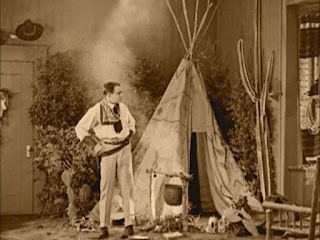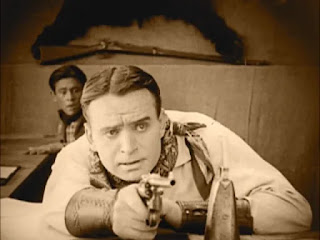Originally released in West Germany on December 11th, 1963 Winnetou was released in the U.S. on May 1st, 1965 under the title Apache Gold. Based on the novel by Karl May, the film is directed by Harald Reinl and stars Pierre Brice and Lex Barker. Though the second film in the series to be released (after The Treasure of Silver Lake) Winnetou is the first, chronologically, and chronicles the first meeting of the titular Apache (played by Brice) and his soon-to-be blood brother, Old Shatterhand (Barker).
The plot involves the construction of the Great Western Railroad which is causing conflict between the Apache and the white settlers. Old Shatterhand is sent by the railway officials to discover why the railroad is not being diverted around the Indian land, as planned. He soon discovers that a man named Santer (Mario Adorf) is behind the trouble. Santer is after a goldmine hidden on Apache land, and will stop at nothing to get it. When a white missionary who has been adapted by the Apache is killed by Santer's gang, it is up to Old Shatterhand to rescue a captured Winnetou and stop Santer before a war breaks out.
The Winnetou series is notable for featuring a protagonist who is an Apache (though he is played by Frenchman Pierre Brice) and the films are generally more sympathetic to Indians then their American counterparts. Unscrupulous white men are invariably the villains. In this film Santer bribes the railway official to build the line through Apache land, and he stirs up the Kiowa against the Apache to further his own ends. Winnetou is much more headstrong then usual in this movie. He is justly angered by the incursions onto Apache land but this leads him to an irrational hatred and mistrust for all the whites. Its only when Old Shatterhand saves his life that he begins to see things differently.
There is a rather contrived the conflict between Winnetou and Old Shatterhand. Winnetou blames Old Shatterhand for not preventing Santer's injustices and is not aware that it was he who saved him (somehow he didn't see Old Shatterhand untie him!). Set to be burned at stake, Old Shatterhand claims an ordeal by battle and is able to triumph without loss of life. It is later proved that he freed Winnetou when Winnetou's sister Nsho-tshi (Marie Versini) produces his necklace, which Old Shatterhand retrieved after saving Winnetou, in the white man's jacket.
Sadly, before this can occur, there is much needless bloodshed, as Winnetou attacks the town of Roswell where Santer is holed up and many innocent settlers and Apache are killed. The film has a tragic tone in general. Shatterhand falls in love with Nsho-tshi, only to loose her during the climax. Santer's girl, who tries to rebel against him, is also tragically killed during the Apache attack. This clashes greatly with the films often obnoxious comic relief leading to some egregious tonal inconsistency. Interestingly much of this comic material was cut from the original U.S. release, with Chris Howland's English news photographer removed completely (conveniently he shares no screen time with Winnetou or Old Shatterhand). This may be one of the few times where the shortened U.S. version is actually superior!
Despite these flaws, Winnetou is still an exciting and well made film. It features one of Lex Barker's better performances in the series as a younger, less experienced Shatterhand. His reaction to Nsho-tshi's death is actually pretty effective. Pierre Brice plays a much more hotheaded Winnetou then usual here, which is an interesting change of pace even if it makes him unlikable at times. Like the other films in the series, it has much more production value then most European westerns made in this period. Harald Reinl's direction is solid and he shows a real command of the action scenes in particular. Ernst W. Kalinke provides some gorgeous cinematography and the film is accompanied by a pleasent, if occasionally ill fitting, score from Martin Böttcher.
Score: 7/10
















